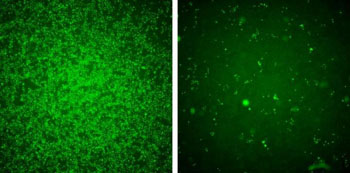Human Interferon-Induced Protein Blocks Zika Virus Infection
By LabMedica International staff writers
Posted on 15 Jun 2016
A team of molecular virologists has shown that the human protein IFITM3 (interferon-induced protein 3) inhibits Zika virus infection early in the viral life cycle and can prevent Zika-virus-induced cell death.Posted on 15 Jun 2016
The IFITM family of restriction factors has been found to inhibit the replication of a broad range of viruses, including the closely related flaviruses West Nile virus and dengue virus.

Image: IFITM3 blocks Zika virus infection. When human cells are exposed to Zika virus they are overwhelming infected, as seen by the large number of green cells (left panel). When IFITM3 levels were boosted in these cells, the same amount of virus was prevented from replicating (right panel) (Photo courtesy of Brass Lab, University of Massachusetts Medical School).
Investigators at the University of Massachusetts Medical School (Worcester, USA) used tools and assays that had been developed for studying IFITM3 in dengue and influenza virus infections to evaluate the effect of this factor on Zika virus.
They reported in the June 3, 2016, online edition of the journal Cell Reports that IFITM3 and the closely related IFITM1 inhibited Zika virus infection early in the viral life cycle. Moreover, IFITM3 was shown to prevent Zika-virus-induced cell death.
"We simply adapted the technology we had developed over the last four years working with dengue, influenza, and other viruses to begin work on Zika virus," said senior author Dr. Abraham Brass, assistant professor of microbiology and physiological systems at the University of Massachusetts Medical School.
"This work represents the first look at how our cells defend themselves against Zika virus' attack," said Dr. Brass. "Our results show that Zika virus has a weakness that we could potentially exploit to prevent or stop infection. A lot of data by us and others in the field has shown that IFITM3 has a big impact on blocking many emerging viruses such as dengue, Zika, and Ebola. Given our recent results with Zika virus, it is now even more important that we work to find out how IFITM3 is blocking these viruses, and use that knowledge to prevent and treat infections."
Related Links:
University of Massachusetts Medical School













